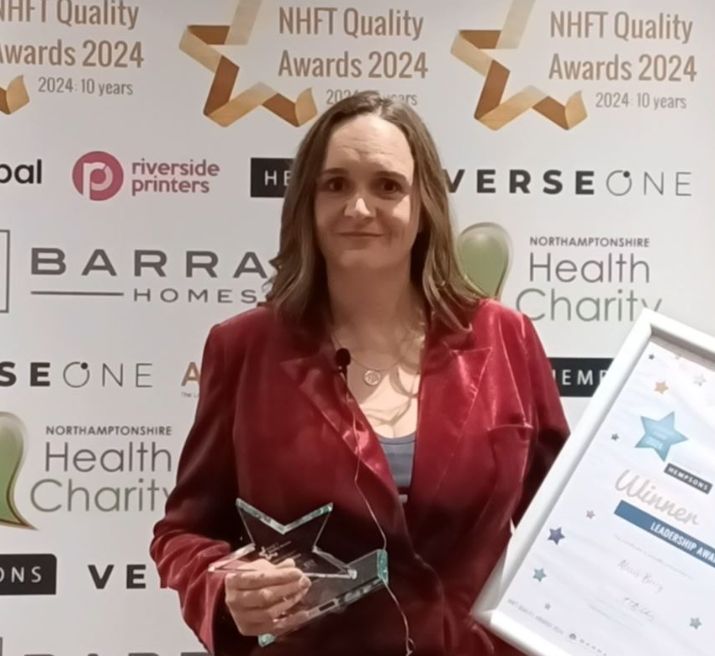Alexis Berry - Leadership Award

We're continuing to spotlight our Quality Awards 2024 winners - the people across NHFT who are making a difference to patients, service users and carers every single day.
We're taking a closer look at the winners and asking them to tell us more about their role and find out why they were nominated.
Having "hope for the future" and being "open to change" are just two of the qualities of a good leader, according to an NHFT colleague recently recognised for being just that!
Dr Alexis Berry won the 'Leadership Award' at the recent Quality Awards, having been described by the person who nominated her as a "role model" and "one of the most inspiring people I've ever worked with".
Alexis has been flying the flag for psychology at the Trust for nearly 20 years, and has also worked hard to promote equality and inclusivity for communities, as well as bringing in new staff and undergraduates, and creating internships for underrepresented cultural minorities. And she has a strong vision in the future to develop better links with the third sector, particularly around preventative psychological programmes.
Alexis started at the Trust in the Community Mental Health Team and Psychology outpatients, later taking a role at the Welland Centre in Kettering.
Alongside her job at NHFT, she took on a role at Oxford University as a research tutor in the Institute of Clinical Psychology Training over eight years, which complemented her being a clinical psychologist. Alexis then worked in Inpatient Psychology at Berrywood Hospital.
It was around this time that she fulfilled her ambition to work with older people; taking on the only NHFT older people's psychology role at the time, looking after people with conditions such as dementia.
Alexis said: "I always wanted to work with older patients; I like the close working with families. I also like the real joined-up approach to work; it's a very integrated way of working, supporting people in a holistic way."
Over the next decade, Alexis aimed to replicate the good work happening in adult mental health and apply to it her work with older people, to create a consistency for patients regardless of age. She soon established there was an urgent need to expand and build up the service to support demand.
By speaking to people from other counties, she was able to benchmark what was available and what worked elsewhere.
Alexis said: "I also met with older people in the county. We had a lot of great third sector organisations, including dementia cafes being run by the Alzheimer's Society, so I spoke to families and asked them what they needed after a diagnosis. They mentioned that things were quite difficult to navigate in terms of where you could get support; so I spent a lot of time thinking how do we join up things and how do we develop a programme that means people know how to access support."
This led to some great partnership working with Northamptonshire Carers and, throughout the Covid pandemic, developing some innovative solutions such as free 'Memory clubs' for people in the early stages of dementia, which continue to be incredibly popular today.
Alexis said she feels "very proud" of the memory clubs, which are supported with NHFT expertise, because they are something being provided which local families said they wanted.
"We've had great feedback from families using the memory clubs which is great" said Alexis, "and they have grown through word of mouth, and we now have several running across the county."
She said the weekly Memory clubs aim to be fun and encourage people who attend to push themselves and try new things.
Alexis has also been instrumental in developing the therapeutic pathway for older people with personality disorders, psychosis, depression, and complex emotional needs, with support from her team. This includes family focused work, supporting families of people who may have recently had a diagnosis of dementia, psychosis or depression, and look to build on the resources and the strengths in family networks to help people recover.
Alexis has recently taken on a new position as lead psychologist for the care delivery pathway, which includes adult mental health, and in that new role, she will be looking at how she can bring some of the good practice which she has instilled in older people's services, back to adult mental health.
She has supported members of her team to create courses for the Recovery College NHFT about some of the mental health challenges people face when retiring from work in terms of identity and friendships, and they are currently developing a new course focusing on education around delirium.
Speaking about her Quality Award win, Alexis said she was very surprised but honoured to be nominated.
"I've worked with some great people," she said, "I've had good role models to follow, who I have learned a lot from at NHFT, and also when I was at Oxford. I want to get the best out of people at work, so it's important that they can be who they are, and be honest with me about what support they need and where they want to be going to, and how I can support them with that development."
When asked what she thinks makes a good 'leader', Alexis said: "I think you've got to have hope for the future. I've always talked to people about my 2, 5 and 10 year plans, so I think I try and structure expectations, because things can feel quite overwhelming. But I think it's really important to have direction of where you think things need to go, and be open to changing that too. I definitely think good leaders aren't fixed, and they will change what they're doing based on contradictory or new evidence - so remaining open is really important."

